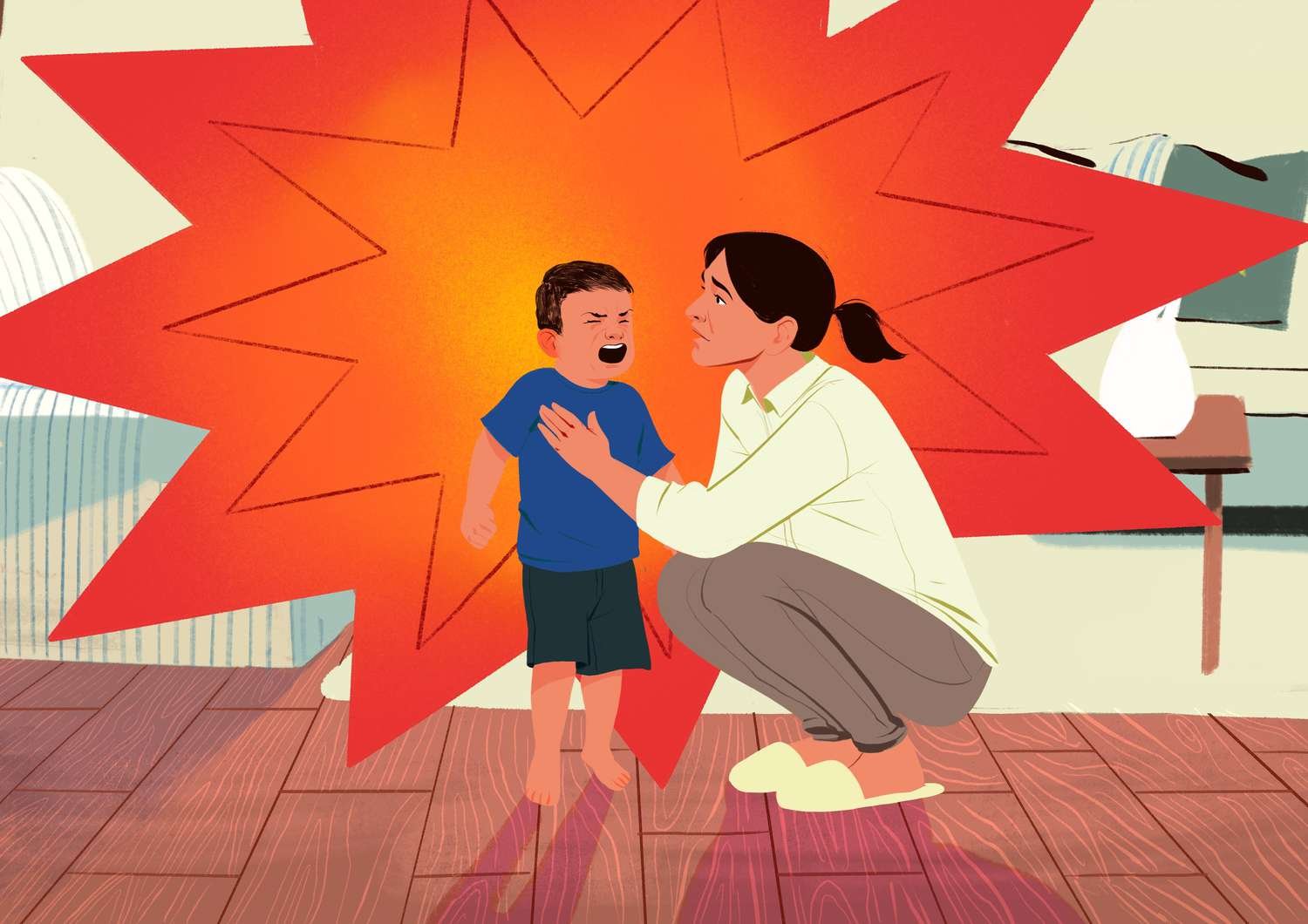Signs You Were Raised by a Narcissist: Healing Begins Here
Narcissism is characterized by an excessive need for admiration and a lack of empathy for others.
When it manifests in parenting, it can have profound implications.
A narcissistic parent often prioritizes their own needs and desires over those of their children.
This behavior leads to a range of emotional and psychological challenges for the child.
What are the signs you were raised by a narcissist?
Signs of narcissistic parenting are emotional manipulation, lack of empathy, excessive criticism, boundary violations, enforced dependency, identity issues, and chronic self-doubt in children.
Key Takeaways:
Narcissistic parents prioritize their needs over their children's.
Children of narcissists often struggle with self-worth and identity issues.
Signs include emotional manipulation, lack of empathy, excessive criticism, and boundary violations.
Effects can include chronic self-doubt, fear of failure/success, and difficulty forming healthy relationships.
Recognizing these signs is crucial for healing and personal growth.
Traits of a Narcissistic Parent
Understanding the traits of a narcissistic parent whether it is a narcissistic mother or father is crucial for anyone who suspects they may have been raised in such an environment.
Children raised by narcissists often experience a distorted sense of self-worth.
They struggle with issues related to self-esteem and personal identity.
The constant need to meet the unrealistic expectations of a narcissistic parent can lead to feelings of inadequacy and chronic self-doubt.
Additionally, the lack of genuine emotional support and validation can result in long-term emotional damage.
This damage affects parent-child relationships and overall mental health.
Impact on the Child
Recognizing the signs of being raised by a narcissist is a vital step toward personal growth and healing. It allows individuals to understand how narcissistic mothers tend to shape their children's emotional landscape and the root causes of their struggles.
They can then take proactive steps to address these issues and overcome the ways a narcissistic mother affect their adult relationships and self-perception.
By identifying these signs, one can begin to break free from the toxic patterns instilled during childhood. This process is essential for building a healthier, more fulfilling life.
I have added the mother just as an example here. You can replace it with word "Father" if that's suits you the most.
Seeking Help and Support
Understanding the dynamics of a narcissistic family and the specific behaviors of narcissistic parents can provide clarity and validation.
This understanding is crucial for those who have long felt confused or misunderstood.
It is essential to acknowledge the impact of such an upbringing.
Seeking appropriate support and resources is important for navigating the path to recovery.
Emotional Manipulation
Inconsistent Love and Affection
Narcissistic parents including the grandparents often exhibit inconsistent love and affection.
This creates a confusing and unstable emotional environment for their children.
This inconsistency can manifest in several ways, each contributing to a child's own sense of insecurity and self-doubt.
Unpredictable Emotional Responses
One hallmark of narcissistic parent traits is their unpredictable emotional responses.
A child may never know what to expect from their parent, as reactions can vary wildly from one moment to the next.
This unpredictability keeps the child on edge, constantly trying to anticipate and adapt to the parent's shifting moods.
The lack of a stable emotional foundation can lead to anxiety and a persistent feeling of walking on eggshells.
Conditional Approval and Affection
Narcissistic parents often make their love and approval conditional, based on the child's ability to meet their expectations or fulfill their needs.
This conditional affection teaches the child that they must earn love, rather than it being given unconditionally.
As a result, the child may grow up feeling that they are never good enough and must constantly strive for perfection to gain approval.
This can lead to a lifelong pattern of seeking validation from others and struggling with self-worth.
Frequent Guilt-Tripping and Shaming
Guilt-tripping and shaming are common tactics used by narcissistic parents to manipulate their children.
By making the child feel guilty or ashamed for their actions, thoughts, or feelings, the parent maintains control and reinforces their dominance.
This emotional and narcissistic abuse can leave deep scars, causing the child to internalize feelings of guilt and shame that persist into adulthood.
The constant barrage of negative reinforcement can erode the child's self-esteem and create a pervasive sense of inadequacy.
Lack of Empathy
Lack of Empathy in Narcissistic Parents
Signs You Were Raised by a Narcissist: Lack of Empathy
A hallmark of narcissistic personality disorder in parents is their profound inability to empathize. Narcissistic mothers, in particular, tend to be emotionally disconnected from their children's inner worlds.
This pervasive lack of empathy can profoundly impact a child's psychological growth and well-being.
Narcissistic mothers often struggle to comprehend or validate their offspring's emotions and experiences.
Their self-absorption leaves little room for understanding their child's perspective. This emotional neglect can be especially damaging, as children of narcissistic parents may internalize the belief that their feelings are insignificant or invalid.
The way a narcissistic mother affects her child's development is often through being overly critical and dismissive of their emotional needs.
This constant invalidation can lead to long-lasting insecurities and difficulties in forming healthy relationships later in life. The child may grow up feeling perpetually misunderstood and emotionally neglected, carrying these wounds into adulthood.
Difficulty in Acknowledging Your Feelings
Narcissistic parents often fail to acknowledge or validate their child's feelings.
Instead of offering support, they may dismiss or minimize the child's emotions.
This makes the child feel insignificant and leads to confusion and self-doubt.
The child may begin to question their own feelings and experiences.
Over time, this can result in difficulty trusting their own emotions and a tendency to suppress them.
Prioritizing Their Emotions Over Yours
In a narcissistic family, the parent's emotions and needs always take precedence over the child's.
The child is expected to cater to the parent's emotional demands, regardless of their own needs.
This teaches the child that their feelings are less important and that they must prioritize others' emotions over their own.
Such an imbalance can lead to codependent behavior and difficulty setting healthy boundaries in relationships.
Invalidation of Your Emotional Experiences
Narcissistic parents frequently invalidate their children's emotional experiences.
They dismiss the child's feelings as overreactions or unwarranted.
This invalidation can make the child feel misunderstood and isolated, as their emotional reality is constantly denied.
The long-term effects of this emotional neglect can include difficulty expressing emotions, low self-esteem, and a pervasive sense of loneliness.
Excessive Criticism or Idealization
Oscillating Between Criticism and Idealization
Narcissistic parents often swing between excessive criticism and idealization.
This erratic behavior creates a confusing and unstable environment for their children.
Such inconsistency can have significant impacts on the child's self-esteem and sense of identity.
Unrealistic Expectations
Narcissistic parents frequently impose unrealistic expectations on their children.
They demand perfection in various aspects of their lives.
These high standards are often unattainable, setting the child up for failure and disappointment.
The constant pressure to meet these expectations can lead to chronic stress and anxiety.
The child may feel they can never measure up, resulting in burnout and a fear of failure.
Chronic Dissatisfaction
No matter how hard the child tries, a narcissistic parent is often chronically dissatisfied with their efforts.
This persistent dissatisfaction can be demoralizing, as the child feels they can never please their parent.
Constant criticism and lack of appreciation can erode the child's self-confidence.
It creates a deep-seated belief that they are inherently flawed.
This sense of inadequacy can affect their personal and professional relationships well into adulthood.
Oscillating Between Praise and Put-Downs
Narcissistic parents often alternate between excessive praise and harsh put-downs.
One moment, the child may be idealized and showered with praise.
The next moment, they may be harshly criticized and demeaned.
This erratic behavior leaves the child feeling bewildered and unsure of their worth.
The inconsistency in feedback can make it difficult for the child to develop a stable sense of self.
It can also lead to a constant need for external validation.
Understanding and Healing
Understanding these patterns of emotional manipulation is crucial.
Recognizing these signs helps individuals grasp the impact of their upbringing.
By identifying these behaviors, one can begin the journey toward healing and personal growth.
Control and Domination
Enforced Dependency
Narcissistic parents often enforce dependency to maintain control over their children.
This tactic ensures the child remains reliant on the parent for guidance, approval, and decision-making.
It reinforces the parent's dominance and control.
Discouraging Independent Thinking or Actions
One way narcissistic parents enforce dependency is by discouraging independent thinking or actions.
They may belittle or dismiss the child's ideas and decisions.
This makes the child feel incapable of making sound judgments on their own.
Constant undermining can stifle the child's ability to develop critical thinking skills and self-confidence.
Over time, the child may come to believe they are incapable of functioning independently.
This belief perpetuates a cycle of reliance on the parent.
Over-involvement in Personal Decisions
Narcissistic parents often exhibit over-involvement in their child's personal decisions.
This can range from dictating what the child should wear or eat to making decisions about their education, career, and relationships.
By inserting themselves into every aspect of the child's life, the parent ensures the child remains dependent on their guidance and approval.
This level of control can hinder the child's ability to develop autonomy and make independent choices.
Making You Feel Incapable Without Their Guidance
A common tactic used by narcissistic parents is to make their children feel incapable without their guidance.
They may constantly remind the child of their perceived inadequacies.
The parent emphasizes their superior knowledge and experience.
This manipulation creates a sense of helplessness in the child.
The child may believe they cannot succeed without the parent's intervention.
This enforced dependency can lead to difficulties in making decisions and asserting oneself in adulthood.
Boundary Violations
Boundary Violations in Narcissistic Parents
Boundary violations are a significant aspect of narcissistic parent behavior.
These parents often disregard their child's personal boundaries.
This disregard leads to a lack of privacy and autonomy for the child.
Disregard for Personal Privacy
Narcissistic parents frequently ignore their child's need for personal privacy.
They may intrude into the child's personal space, read their private messages, or eavesdrop on their conversations.
This lack of respect for privacy can make the child feel violated and powerless.
Constant invasion of personal space can lead to a sense of vulnerability and mistrust.
The child learns that their boundaries are not respected.
Intrusive Questioning and Micromanagement
Intrusive questioning and micromanagement are common tactics used by narcissistic parents to maintain control.
They may constantly interrogate the child about their activities, thoughts, and feelings.
This leaves little room for personal autonomy and can feel overwhelming and stifling.
The child feels they are under constant surveillance.
Micromanagement extends to various aspects of the child's life, from daily routines to long-term goals.
This leaves little room for independent decision-making.
Difficulty Respecting Your Personal Space
Narcissistic parents often have difficulty respecting their child's personal space, both physically and emotionally.
They may invade the child's room without permission, interrupt their activities, or impose their presence in situations where the child seeks solitude.
This lack of respect for personal space can create a sense of suffocation and frustration.
The child may struggle to establish healthy boundaries in other relationships.
They have not been allowed to develop a sense of personal autonomy.
Emotional Blackmail
Emotional Blackmail in Narcissistic Parenting
Emotional blackmail is a powerful tool used by narcissistic parents to manipulate and control their children.
They leverage love, approval, and fear to create a sense of indebtedness and dependency.
Using Love or Approval as Leverage
Narcissistic parents often use love or approval as leverage to manipulate their children.
They may withhold affection or praise until the child complies with their demands or meets their expectations.
This conditional love teaches the child that they must earn affection, leading to a constant need for validation.
The fear of losing the parent's approval can drive the child to conform to the parent's wishes, even at the expense of their own needs and desires.
Threatening Withdrawal or Punishment
Threatening withdrawal or punishment is another common tactic of emotional blackmail.
Narcissistic parents may threaten to withdraw their love, support, or presence if the child does not comply with their demands.
This threat creates fear and insecurity, as the child feels they must constantly appease the parent to avoid abandonment.
The fear of punishment can also be a powerful motivator, leading the child to suppress their own needs and desires to avoid the parent's wrath.
Creating a Sense of Indebtedness
Narcissistic parents often create a sense of indebtedness in their adult children.
They remind the child of all the sacrifices and efforts they have made on their behalf.
This tactic reinforces the idea that the child owes the parent and must repay them through compliance and loyalty.
The constant reminder of the parent's sacrifices can create guilt and obligation.
It makes it difficult for the child to assert their independence.
Understanding and Healing
Understanding the tactics of control and domination used by narcissistic parents is essential.
Recognizing these behaviors helps individuals grasp the impact of their upbringing.
By identifying these tactics, one can begin to understand their effects and take steps toward healing and personal growth.
Eroded Self-Worth
Chronic Self-Doubt
One of the most pervasive effects of narcissistic parenting is the chronic self-doubt instilled in the child.
This self-doubt can manifest in various ways and significantly impact the individual's ability to trust themselves and their decisions.
Frequent Second-Guessing Your Actions and Decisions
Children raised by narcissists often find themselves frequently second-guessing their actions and decisions.
Constant criticism and unrealistic expectations from the parent can lead to a lack of confidence in one’s abilities.
This persistent self-doubt can make even simple decisions feel overwhelming.
The fear of making the wrong choice can be paralyzing.
The habit of second-guessing can extend into adulthood, affecting personal and professional life.
It can lead to indecisiveness and anxiety.
Difficulty Trusting Your Judgment
Narcissistic parents often undermine their children's judgment, making them feel incapable of making sound decisions.
Constant invalidation erodes the child's trust in their own judgment.
This leads to a reliance on others for guidance and approval.
The individual may struggle to make independent choices and always seek reassurance from external sources.
Difficulty in trusting one’s judgment can hinder personal growth and the ability to navigate life’s challenges confidently.
Internalized Negative Self-Perceptions
Negative feedback and emotional abuse from a narcissistic parent can lead to internalized negative self-perceptions.
The child may grow up believing they are inherently flawed, unworthy, or incapable.
These negative self-perceptions can become deeply ingrained, affecting self-esteem and self-worth.
The individual may struggle with feelings of inadequacy and self-criticism.
These issues can impact their relationships, careers, and overall well-being.
Identity Issues
Identity Issues from Narcissistic Parenting
Narcissistic parenting can lead to significant identity issues.
The child struggles to develop a clear sense of self due to constant manipulation and control.
This can make it difficult for the individual to establish their own identity and values.
Lack of a Clear Self-Concept
Children raised by narcissists often lack a clear self-concept.
Their identity is overshadowed by the parent's needs and expectations.
The constant pressure to conform to the parent's ideals makes it challenging for the child to explore their own interests, values, and beliefs.
This can lead to confusion and a sense of emptiness.
The individual struggles to define who they are outside of the parent's influence.
Over-reliance on External Validation
Narcissistic parents often teach their children to seek validation from external sources.
The child learns to measure their value based on the approval and praise of others.
This creates an over-reliance on external validation.
The individual becomes vulnerable to manipulation and criticism, as their self-esteem is tied to the opinions of others.
The constant need for validation can also lead to anxiety and a fear of rejection.
Difficulty Establishing Personal Values and Beliefs
The control and manipulation exerted by narcissistic parents can make it difficult for the child to establish their own values and beliefs.
The parent often imposes their own views and expectations.
This leaves little room for the child to explore and develop their own values and beliefs.
As a result, the individual may lack direction and purpose.
They may struggle with a sense of disconnection and a lack of fulfillment.
Fear of Failure and Success
Narcissistic parenting can instill a profound fear of both failure and success in the child.
This fear can hinder personal and professional growth, as the individual struggles to navigate life's challenges and opportunities.
Anxiety Over Making Mistakes
Constant criticism and unrealistic expectations from a narcissistic parent can create deep-seated anxiety over making mistakes.
The child learns to fear failure due to harsh judgment and disappointment from the parent.
This anxiety can lead to perfectionism and an aversion to taking risks.
The individual strives to avoid any possibility of failure, which can be paralyzing.
This fear prevents them from pursuing new opportunities and experiences.
Reluctance to Take Risks or Try New Things
The fear of failure instilled by narcissistic parenting can also result in a reluctance to take risks or try new things.
The individual may avoid stepping out of their comfort zone, fearing potential failure and criticism.
This reluctance limits personal growth and the ability to achieve one's full potential.
The individual may miss out on valuable opportunities and experiences, held back by their fear of the unknown.
Sabotaging Your Achievements and Progress
In some cases, the fear of success can be just as debilitating as the fear of failure.
Children raised by narcissists may sabotage their own achievements and progress.
They fear the increased expectations and scrutiny that come with success.
The individual may downplay their accomplishments or avoid pursuing their goals.
They may be uncomfortable with the attention and pressure that success brings.
This self-sabotage can prevent them from reaching their full potential and achieving their dreams.
Understanding and Healing
Understanding how narcissistic parenting erodes self-worth is crucial.
Recognizing these signs helps individuals grasp the impact of their upbringing.
By identifying these behaviors and their effects, one can begin to understand and take steps towards healing and personal growth.
Frequently Asked Questions:
1. What are the effects on children raised by narcissistic parents?
Children raised by narcissistic parents often struggle with distorted self-worth and self-esteem issues.
They may experience chronic self-doubt and a distorted personal identity.
This leads to feelings of inadequacy and long-term emotional damage affecting their relationships and mental health.
2. How does narcissistic parenting affect a child's sense of identity?
Narcissistic parenting can hinder a child’s ability to develop a clear self-concept.
Children may struggle to explore their own values and interests due to constant parental pressure.
They might become overly reliant on external validation and have difficulty establishing personal beliefs.
3. What are common signs of emotional manipulation by narcissistic parents?
Narcissistic parents may use inconsistent love and affection to create emotional instability.
They often engage in conditional approval and frequent guilt-tripping to maintain control.
Their lack of empathy and frequent invalidation of the child’s feelings can also be major indicators.
Conclusion
Narcissistic parenting prioritizes the parent's needs over the child's, leading to emotional and psychological challenges.
This behavior results in distorted self-worth and ongoing struggles with self-esteem for the child.
Recognizing and addressing these impacts is crucial for personal growth and healing.






